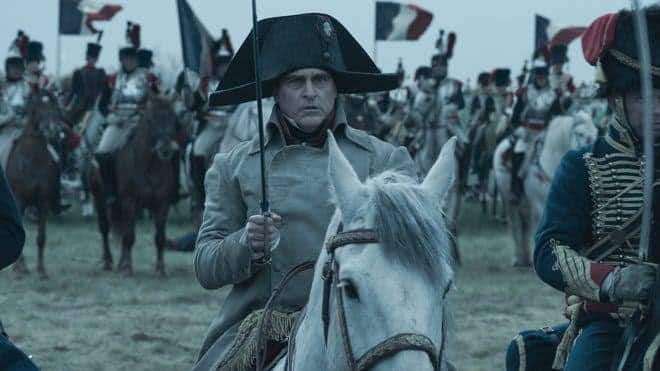Ridley Scott’s “Napoleon” delivers an epic historical drama that meticulously navigates the tumultuous life of one of history’s most influential figures. Joaquin Phoenix steps into the formidable role of Napoleon Bonaparte, bringing a commanding presence to the screen, while Vanessa Kirby adds depth and charisma as Empress Joséphine.
The film, written by David Scarpa, takes on the ambitious task of chronicling Napoleon’s rise to power and subsequent fall, providing a comprehensive portrayal of the complex leader. As directed and produced by Ridley Scott, known for his prowess in historical dramas, “Napoleon” emerges as a visually captivating and emotionally resonant journey through pivotal moments in French history.
Joaquin Phoenix’s portrayal of Napoleon Bonaparte is nothing short of captivating. Phoenix captures the essence of Napoleon’s ambition, charisma, and strategic brilliance, offering a nuanced performance that delves into the multifaceted personality of the French Emperor. His ability to convey both the steely determination and the vulnerability of Napoleon adds layers to the character, making him more than just a historical figure but a complex human being.
Opposite Phoenix, Vanessa Kirby shines as Empress Joséphine, bringing grace and strength to the role. The chemistry between Phoenix and Kirby is palpable, offering a glimpse into the complex and often tumultuous relationship between Napoleon and Joséphine. Kirby’s portrayal of the Empress Consort adds emotional depth to the narrative, providing a compelling counterbalance to the intensity of Napoleon’s character.
The supporting cast further enhances the film’s richness. Tahar Rahim delivers a compelling performance as Paul Barras, a key political figure during the French Revolution. Ben Miles as Caulaincourt, Ludivine Sagnier as Thérésa Cabarrus, and Matthew Needham as Lucien Bonaparte contribute to the intricate web of characters surrounding Napoleon, each bringing their own motivations and conflicts to the narrative.

The film’s portrayal of Napoleon’s military campaigns is a visual feast, with Ridley Scott masterfully recreating key battles such as the Siege of Toulon, 13 Vendémiaire, the Battle of the Pyramids, the Battle of Austerlitz, and the climactic Battle of Waterloo. The meticulous attention to historical detail, combined with Scott’s directorial finesse, creates a cinematic experience that immerses the audience in the grandeur and chaos of Napoleonic warfare.
Also read: Wish Disney Movie Review: A Fantastic Animated Musical Fantasy Film
The ensemble cast, featuring notable performances from John Hollingworth as Marshal Ney, Youssef Kerkour as Marshal Davout, and Phil Cornwell as Sanson ‘The Bourreau,’ contributes to the film’s authenticity. Each actor embodies their historical counterparts with conviction, bringing the era to life with a blend of intensity and subtlety.
Ridley Scott’s directorial vision is evident in every frame of “Napoleon.” The film’s visual splendor is complemented by the evocative cinematography, capturing the grandeur of Napoleonic France while also delving into the intimate moments that shape the characters. The attention to period-accurate costumes, set design, and overall aesthetic enhances the authenticity of the film, transporting viewers to a bygone era.
The screenplay by David Scarpa skillfully weaves together historical events, political intrigue, and personal relationships, offering a comprehensive narrative that unfolds across the sweeping canvas of Napoleon’s life. The film does not shy away from portraying the complexities and controversies surrounding Napoleon, presenting a nuanced perspective that allows viewers to engage with the historical figure on a more profound level.
The film’s exploration of Napoleon’s relationships, particularly with Empress Joséphine, adds a layer of emotional depth. Vanessa Kirby’s portrayal of Joséphine brings a sense of humanity to the Empress, highlighting the sacrifices and challenges faced by those in Napoleon’s inner circle. The dynamics between the characters, from political allies to familial bonds, contribute to the film’s multifaceted storytelling.
In showcasing Napoleon’s relationships, the film delves into the intricacies of power and the personal toll it takes on those who wield it. The portrayal of historical figures such as Louis XVIII, played by Ian McNeice, and Arthur Wellesley, portrayed by Rupert Everett, adds political dimensions to the narrative, illustrating the web of alliances and rivalries that defined the era.
The film’s runtime allows for a comprehensive exploration of Napoleon’s life, yet it maintains a steady pace, ensuring that the narrative unfolds organically. The inclusion of key historical events, such as the execution of Louis XVI and Napoleon’s exile to Elba, adds layers to the storyline, providing context to the choices and challenges faced by the French leader.
In conclusion, Ridley Scott’s “Napoleon” stands as a cinematic triumph, blending historical accuracy with compelling storytelling and outstanding performances. Joaquin Phoenix’s portrayal of Napoleon is a tour de force, supported by a stellar cast that brings depth and authenticity to the narrative. The film’s visual spectacle, coupled with its exploration of power, relationships, and the complexities of history, makes “Napoleon” a must-watch for both history enthusiasts and cinephiles alike. As the film immerses audiences in the grandeur and tumult of Napoleonic France, it leaves an indelible mark as a cinematic masterpiece that transcends the boundaries of historical drama.


